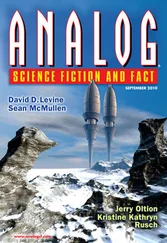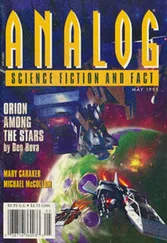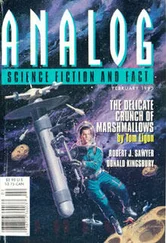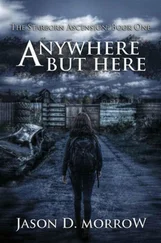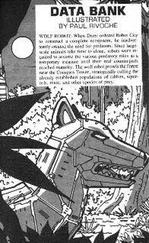“Not for the moment, anyway,” Donna admitted.
“Not ever,” Trent said. “Anything more is just luxury. Hell, the pickup and the stove and the refrigerator are luxury. We could probably get by with a tent and a pocket knife if we really had to.”
“And a condom and a wedding ring,” Donna said playfully.
“Don’t need that with all these arrows layin’ around.” He tilted his head back and looked up into the leaves overhead. They made a kaleidoscope of green and gray against the sky. “Life is real here. It’s all so… immediate. Rain and rocks and trees and streams. We go home and we’re going to be right back in the middle of all the crap we were tryin’ to get away from, only worse because we can’t just go on livin’ the way we were now that we know what our government is really doing to people.”
Donna shifted uncomfortably. “What can we do, though? We’d make pathetic revolutionaries. You could probably assassinate the president if you put your mind to it, but that wouldn’t stop anything. You’d have to knock off everyone down to the White House janitor before you got a replacement president who wouldn’t just keep the same system in place.”
“Killing people ain’t the way to make the world a better place,” Trent said. “That’s the kind of thinkin’ that got the country in the mess it’s in.”
“What, then?”
“I don’t know. That’s why I’m kind of happy just to hang out here for a while.”
Neither one of them had much to say after that. They waited a few more minutes, and when the buffaloceros still hadn’t returned they went back out to the downed tree and lopped its top off. They moved over to the second tree that the buffaloceros had head-butted, dropped that one uphill, too, and cut it to the same length as the first one. Then they shoved them both out over the pool below the waterfall, making sure they stuck out just far enough to mount the motor on. There was enough length left on the bank to hold them in place while they hauled rocks up from the stream bed to weigh them down.
That was an all-day job right there. It took a lot of rocks to hold the logs down under the kind of weight the motor and a tire would put on the free ends. Trent tested their progress from time to time by walking out on the span over the water, edging out a few inches at a time until the logs started to overbalance.
“Don’t you go falling in,” Donna told him. “It’s too damned cold today to get wet.”
Trent was already pretty well soaked from rain and sweat, but he didn’t want to fall into the pool either. Fortunately the logs were as non-skid as sandpaper from the little pockets where arrow-branches had broken free. He couldn’t have slipped if he’d wanted to.
They broke for lunch, hauling an armload of arrows down to the camper on their way, then after they’d eaten the last of the ham sandwiches and chased them with a beer, Donna sat down at the table with the computer again while Trent went outside and piled more rocks on the logs. He didn’t give her any trouble about it this time. She did have to spend some time at it if she was going to make any progress.
It took another couple hours of rock-hauling to make the counterweight heavy enough to support the motor. It would have been easier if the stream wasn’t running high, but Trent had to scrounge his rocks from the upper bank, and his supply grew steadily farther away as he worked. At last he called it good, and went back to the pickup to remove the motor.
The ground was soaking wet, even beneath the tree. He considered waiting for the rainstorm to blow over, but this felt like the kind of rain that could go on for days, and he knew he would go nuts with anticipation if he couldn’t test his idea before the day was out. So he took the tarp off the woodpile and laid it on the ground in front of the left rear wheel and slid under the pickup with his tools to begin removing the wheel, motor and all.
It wasn’t all that difficult. The motor was mounted to a couple of swing arms that kept it horizontal throughout the suspension’s range of travel, and the disk brake and the tire were both mounted to the same hub at the end of the axle that stuck out of the motor. He jacked up the truck to take the weight off it, supporting the jack on a flat rock scrounged from an outcrop at the head of the meadow and backing it up with a length of firewood wedged in next to it, then he simply loosened the bolts on the swing arms until the motor came free.
He left the tire mounted so it would support part of the motor’s weight. That way he could move it by just lifting the other end of the motor and rolling the whole works along, but he didn’t put it out on the logs yet. He still needed to figure out what to do for paddles, so the water would actually turn the wheel.
He had plenty of arrows. He supposed he could tie a bunch of them to the sides of the tire so the ends stuck out past the tread, and then tie beer cans with the tops cut off to the ends of the arrows. They wouldn’t hold much water, though, and when the motor was in braking mode, it would resist turning pretty hard. He would probably need something that held more water, like hollowed-out chunks of log. That would probably provide enough resistance, but it would be a lot of work to hollow them out. He needed something that was hollow already, and would hold some serious water.
A dozen slo-mo shells would do it, but the rising water had washed all the debris off the gravel bar where he’d gotten his helmet, and there weren’t any more dead ones in the meadow. There weren’t any live ones there today, either. They must not like flopping through mud. He would have to go out hunting for them to find any at all, live or dead.
The idea of killing a dozen animals just to provide scoops for his waterwheel wasn’t all that appealing, either. He decided he would rather walk down the valley a ways, following the stream and checking out any open ground he found along the way. It might even be easier to find what he needed today than on a dry day. Any slo-mos he found out in the open today were most likely going to be dead already, so at least he wouldn’t have to keep flipping them over like he had done yesterday.
He had taken off his armor while he was under the truck. Now he put it on again and stuck his head inside the camper. “I’m going for a walk downstream to look for empty slo-mo shells. Back in an hour or two.”
Donna had wrapped herself up in a blanket, but with the blue light from the screen on her face, she looked cold even so. She looked up and said, “Okay. Take the rifle.”
“It’s too rainy to be carryin’ that around. I’ve got the pistol; that’ll do.”
“All right. Be careful.”
He needed something to carry the empty shells in, assuming he found any. He tried to think what would work, but the only big container they had in the camper was a five-gallon water bucket, and that would only carry three or four slo-mo shells. They had some plastic garbage bags, but those probably wouldn’t hold up to the weight. They didn’t have a duffel bag or a laundry bag or anything like that. It was starting to sink in just how little equipment they did have, way out here in the ass end of nowhere.
They had a tarp. He could throw whatever he found in the middle of that and gather the ends to make a sack. That would have to do. He pulled it out from under the pickup, folded it as small as it would go, and set off to see what he could find downstream.
The days were definitely longer here. He had hauled rocks for a couple of hours alter lunch, and spent at least two more hours taking the wheel motor off the pickup, but the sky was still as bright as ever. That wasn’t all too bright today, but the gray didn’t have that soon-to-be-dark cast to it that it got at the end of a day. Trent told himself he would turn around at the first sign of darkness, or at the end of an hour, whichever came first. He didn’t think he’d forget; he was already growing hungry. They might have to start eating four meals a day if they stayed here for long.
Читать дальше


